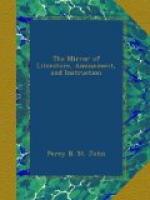“If, in addition to his personal qualifications, the mendicant chanced to be a King’s Bedesman, or Blue Gown, he belonged, in virtue thereof, to the aristocracy of his order, and was esteemed a person of great importance.”
An extract then follows from an account of payments to “Blew Gownis,” by Sir Robert Melvill, of Murdocarney, treasurer-depute of King James VI., furnished to the author of “Waverley,” by an officer of the Register House; after which Sir Walter proceeds as follows:—
“I have only to add, that although the institution of King’s Bedesmen still subsists, they are now seldom to be seen in the streets of Edinburgh, of which their peculiar dress made them rather a characteristic feature.
“Having thus given an account of the genus and species to which Edie Ochiltree appertains, the author may add, that the individual he had in his eye was Andrew Gemmells, an old mendicant of the character described, who was many years since well known, and must still be remembered, in the vales of Gala, Tweed, Ettrick, Yarrow, and the adjoining country.
“The author has in his youth repeatedly seen and conversed with Andrew, but cannot recollect whether he held the rank of Blue Gown. He was a remarkably fine old figure, very tall, and maintaining a soldier-like, or military manner and address. His features were intelligent, with a powerful expression of sarcasm. His motions were always so graceful, that he might almost have been suspected of having studied them; for he might, on any occasion, have served as a model for an artist, so remarkably striking were his ordinary attitudes. Andrew Gemmells had little of the cant of his calling; his wants were food and shelter, or a trifle of money, which he always claimed, and seemed to receive, as his due. He sang a good song, told a good story, and could crack a severe jest with all the acumen of Shakspeare’s jesters, though without using, like them, the cloak of insanity. It was some fear of Andrew’s satire, as much as a feeling of kindness or charity, which secured him the general good reception which he enjoyed every where. In fact, a jest of Andrew Gemmells, especially at the expense of a person of consequence, flew round the circle which he frequented, as surely as the bon-mot of a man of established character for wit glides through the fashionable world. Many of his good things are held in remembrance, but are generally too local and personal to be introduced here.




